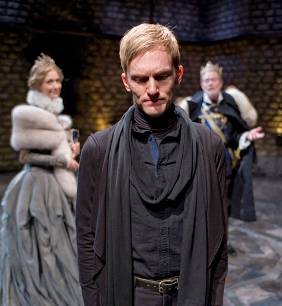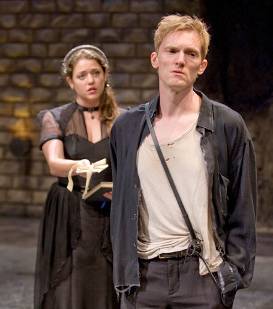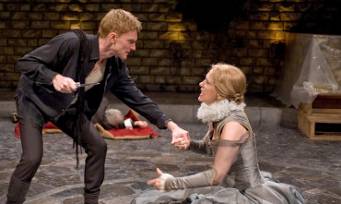Summary 
An ensemble of eleven in a claustrophobic chamber-style drama, enhanced with cinematic soliloquies in brightly-lit freeze frames. Uneven supporting performances and a mercurial lead performance - ranging from angry young intellectual to wisecracking cross-dresser - in an entertaining and at times effective tragedy.
Design
Directed by Michael Halberstam. Scenic design by Collette Pollard. Costume design by David Hyman. Lighting design by Sarah Hughey. Sound design by Mikhail Fiksel.
Cast
Scott Parkinson (Hamlet), Michael Canavan (Claudius), Shannon Cochran (Gertrude), Ross Lehman (Polonius/Gravedigger), Timothy Edward Kane (Laertes/Player), Liesel Mathews (Ophelia), Witold Huzior (Voltemand/Marcellus/Fortinbras), Kareem Bandealy (Horatio), Larry Yando (Ghost/Player King/Gravedigger), Billy Fenderson (Reynaldo/ Guildenstern), Julian Parker (Rosencrantz/Osric).
Analysis
Writers' Theatre artistic director Michael Halberstam directs Hamlet in the larger of his company's two performance spaces, crafting three acts of 55 minutes, 50 minutes, and 45 minutes around a pair of short intermissions. The stage within the Tudor Court space recalls a claustrophobic dungeon or crypt, a looming brick castle wall lit in orange-yellow upstage, the audience huddled around the perimeter in less than 100 seats. The hard stone floor of the stage features a circular pattern, the overall design suitably dark and shadowy atmospheric.

Halberstam cuts the 1.1 Ghost scene and begins with 1.2, lights coming up on the new King and his celebrating court. Scott Parkinson's Hamlet stands upstage right, leaning against an open door frame with his arms crossed. Parkinson's Hamlet, slim and blond and all angry angles, seethes with petulance, sardonically applauding his uncle's words twice, turning away from Claudius's glance, shouting the word "seems," and spinning in objection at "'tis unmanly grief." Unable to resist his mother's urges for him to stay at Elsinore, he hangs his head in submission, quite opposite the worldly dash of an eager-to-please Laertes, strutting in purple scarf and fur-collared cloak.
Halberstam peppers the production with cinematic soliloquies in brightly lit freeze frames, Parkinson's Hamlet suddenly turning to address the audience in full stage lights as all the other characters freeze in place around him. The stopped-in-time reflections are bold and dramatic, giving even greater focus to the thoughts, wrenching Hamlet from eerie claustrophobia into the pitiless glare of the mind's eye. At 1.2 in sudden brightness he wishes his "too too sullied flesh" would dissolve in grief, squatting to his knees and sharing a locket photograph of his father with the audience, and at 2.2 he emerges from a freeze frame - "what a rogue and peasant slave am I" - as the Player King finishes the King Priam speech, referring to "guilty creatures sitting at a play" with a knowing gesture to each of the three sections of live audience. 3.1 features two such cinematic scenes, Parkinson's "to be, or not to be" question asked in glaring light, concluding oddly with an actual forehead-slap, then Ophelia herself slips into a freeze-frame: "what a mind is here overthrown." Even a late 4.4 scene, Hamlet watching Fortinbras driving an army toward Poland, is a brightly realized interior moment, Halberstam wisely highlighting Hamlet's recognition as he witnesses another murdered king's son flailing about in violent vengeance. The scene brings the second intermission and sets up the quickly paced conclusion.
Parkinson's über-serious Hamlet, glowering and clench-jawed and terse in speech, wears black fingerless gloves to join a bald-headed Horatio and a comically supplicant Marcellus - bowing his head and dropping to his knees whenever Hamlet addresses him - for the 1.3 watch. The Ghost appears upstage, moving slowly to an ominous humming sound effect, shadowy in yellowish light, voice amplified, wearing contacts for a snake's reptilian eyes. The Watch must restrain Hamlet from pursuing 1.4 - "my fate cries out!" - the shadow of the Ghost looming against the upstage wall. In 1.5 Parkinson's Hamlet drops to his knees, cries out "murder," reacts in shock to a touch from the Ghost, and reaches for but misses the grasp of his father as the concerned Watch arrives. Part remembrance and part oath, Hamlet slits his thumb with his knife and smears the red across his forehead, doing the same to Horatio and Marcellus - "swear!' - as the Ghost commands.
Parkinson's cerebral Hamlet is the intense core of Halberstam's production. In 2.2 he appears grieving in an open and torn shirt, shouting the final "words" in "words, words, words" to Polonius and sobbing at "except my life." He seems to cling at first to the friendship of the posers Rosencrantz and Guildenstern, smarmy in their white scarves and affected voices, joining Hamlet seated upon the floor. As Parkinson's Hamlet realizes their duplicity, he nearly pleads for them to understand - "I have lost all my mirth" - then becomes rude and dismissive. He snaps fingers at his now former friends - "look you" - and they exchange glances, mouth words, and make gestures behind his back. Moments later Parkinson's Hamlet dons a jester's cap and bear hugs the Player King - pointedly reminiscent of the elder Hamlet - and he silences Polonius ("tragical-comical-historical-pastoral") with a hand over Polonius's mouth. 3.1 is revealing, Hamlet glancing around for Polonius - "where is your father?" - then when finally noticing the eavesdropper, turning away ("I loved you not"), closing his eyes as he trembles in fury, groaning again at "at home, my lord."
Parkinson's portrayal goes a touch too far, bordering uneasily on parody. After the 3.2 over-instruction of the players, he confides in Horatio but dons a white frilly dress with a fox stole and a tiara crown, then struts to hand Ophelia a "country matters" script for their interaction. He does some odd dancing on the stage then plays an active role in "The Murder of Gonzago," frequently commenting - "as woman's love" - and providing onstage drumbeats at the poisoning of the monarch. His confessional "my wit is diseased" loses poignancy in his use of the head of the fox as a puppet with high-pitched inflection, and he neighs like a horse at his school friends, then speaks like a toddler to Polonius regarding the clouds: "it is a camel." The cross-dressed antics diminish the foreboding at "the very witching time of night" and blunt Hamlet's ensuing conviction, as he draws his dagger: "now could I drink hot blood."

Halberstam elicits mixed results from the supporting performances, the larger roles fairing much better than the array played by a small group of actors. Ross Lehmann invests his Polonius with some interesting chameleon complexity, morphing quickly from the proud and easy-going Dad of Laertes to the stern and rule-heavy father of Ophelia, impatient and clipped in speech. Lehman's suddenly slimy-sly Polonius dispatches a spy after Laertes in 2.1, and after condescending to Ophelia despite her concerns - "I am so affrighted" - he hands her a book 3.1 but immediately snatches it back, then conceals himself for some eavesdropping.

Claudius and Gertrude are effectively portrayed, if reduced in impact by textual edits, Claudius wearing a gold and black military uniform with frizzy shoulder pads like a retired career officer, Gertrude tall and elegant, patiently correcting her new husband's 2.2 misfire on the names Rosencrantz and Guildenstern. Claudius staggers downstage 3.3, pushing on his legs to force himself to pray - "bow stubborn knees" - while Parkinson's Hamlet brandishes a dagger upstage. Shannon Cochran's Gertrude endures her son's assault 3.4, Hamlet showing her her own face in the mirror-reflection from his knife blade. He holds her face against his after the stabbing of Polonius but gives her a wacky and cheerful "good night, mother!" as he drags the body offstage. Cochran's Gertrude practically rushes into the arms of Claudius 4.1, and by 4.5 she is so upset and self-involved she barely registers Ophelia's ranting.
The portrayal of Ophelia is less effective, her tear-stained cheeks and dark mascara-blurred eyes - "the passion of deep grief" - the results of make-up rather than acting. Ophelia does not recognize her brother - "where is this King?" - immediately, kneeling distracted 4.5 then rising to kiss him on the mouth with too much passion for a sister, and Laertes must break himself free. The "flowers" Ophelia distributes to the court are tufts of her own shorn hair, and when she and Laertes exit, Claudius calls for his wife to follow, but Gertrude pointedly exits in the opposite direction. After Hamlet is confronted by his friends - Parkinson twitching a hip at them and drawling like a vaudeville vamp, "but the King is not with the body" - he must be restrained from assaulting Claudius.
The gravediggers are portrayed by the same actors who have played the Ghost and Polonius, but more for broad comedy than for a ghostly wink at the deceased characters. The latter exits with a wheelbarrow while the former delivers his lines with an almost impenetrably showy Cockney accent. The pile of bricks at stage left is revealed to be the opening to a crypt, covered with plywood, and when the funeral procession arrives to the tolling of church bells, Gertrude drops flowers within - "sweets to the sweet" - before Laertes leaps inside to join his sister. Parkinson's Hamlet does not follow suit to confront him, instead waiting onstage - in a gray hoodie and matching shoes - so Laertes must emerge and provide the challenge, cocking his arm as if to punch the Prince. Claudius drinks from a flask as Laertes re-covers the grave with plywood, and Halberstam moves quickly to 5.2, glossing over the telling of Hamlet's pirates tale. Parkinson's Hamlet then collapses in pain, clutching at his chest as Horatio rubs his back, the hint of a failing heart seeming to come from nowhere, and after Laertes refuses to shake hands, the concluding duel begins.
Hamlet seems to suspect foul play from the beginning, eyeing Osric suspiciously while he inspects the weapons - "are these foils all of the same length?" - and the effects of conscience fuel the duel: Laertes continues the bout so quickly that Hamlet cannot drink from the poisoned chalice, and once it is accepted, Gertrude intercepts and drinks the poison on purpose. Halberstam moves the action quickly, Hamlet stabbing Laertes in the leg, Gertrude collapsing, and attendants shouting "treason!" as they flee the stage. After Parkinson's Hamlet stabs Claudius, he pours poisoned wine in his mouth, and Claudius spits graphically before collapsing to his side.
Parkinson's Hamlet prevents Horatio from also drinking the poison, inserting a very long pause in his final words, "and the rest is" quite distant from the final, resonating "silence." This wrenching closing moment would be a memorable ending for the tragedy, but Halberstam includes the entrance of the confused and heavily-accented Norwegian, Fortinbras. The extra touch seems to define this production, a serviceable drama that with a leaner, cleaner approach, would have been a more powerful experience.